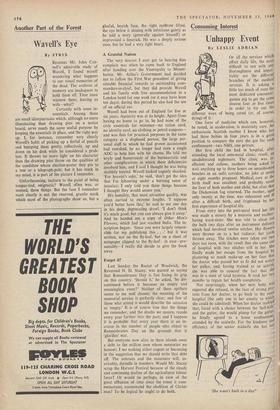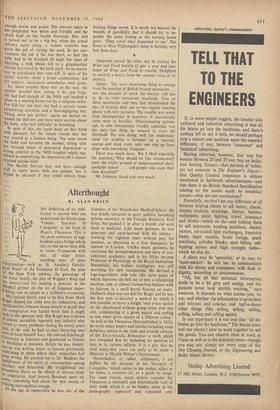Consuming Interest
Unhappy Event
By LESLIE ADRIAN
OF all the services which affect daily life, the most difficult to test with any thoroughness and impar- tiality are the different branches of the medical services. It is asking a little too much of even the most dedicated consumer- guinea pig to get the same disease four or five times in order to try out the
different ways of dying) of it.
One form of medicine which can, however, be tested, in moderation, is maternity care. An enthusiastic Scottish mother I know who has had three babies in four years is in a good position to compare the care she got for each confinement—two NHS, one private.
Her first child she had in hospital, after attending the local ante-natal clinic; result, an unadulterated nightmare. The clinic was in- efficient and callous, mothers being asked ta wait anything up to three hours on uncushioned benches in an unlit corridor, no joke at seven or eight months pregnant. Medical care at the birth itself was excellent and probably saved the lives of both mother and child, but after that the Dickensian fog returned. The mother, aged,' only twenty at the time, was exhausted and ill after a difficult birth, and frightened by her first experience of hospital life.
From entry into the post-natal ward her life was made a misery by a neurotic and mother
- hating ward-sister. She was told to clean out the bath two days after an instrument delivery which had involved twelve stitches. Her flowers were thrown on to a hot radiator, her cards thrown away. The stitches were taken out two days too soon, with the result that she came out of hospital with two stitches still in her. She finally made her escape from the hospital bY plastering so much make-up on her face that the doctor who passed her as fit did not notice her pallor, and, having trained as an actress,, she was able to conceal the fact that she was in a state of total hysteria. It took her two months to regain her health completely. Not surprisingly, when her next baby was expected she refused, in the face of strong Pro-. tests from her doctor, to go back to the sante hospital (the only one in her county to which, she could be admitted). When her doctor realise°, that, faced with a choice between the 'hell-hole and the gutter, she would plump for the gutter, he finally agreed to a home confinement; attended by the midwife. For the kindness and efficiency of the senior midwife she has not being cured (or, of course,
'She wasn't built in a day?'
enough words and praise. The interest taken in her pregnancy was warm and friendly and the check kept on her health thorough. But, and it turned out to be a big but, when the actual delivery came along, a trainee midwife was 'given the job of cutting the cord. In her ner- vousness she cut it far too short, so that the baby had to be watched all night for signs of bleeding, a task which fell to a grandmother already harrowed by the birth itself. As no doctor was in attendance (her own GP, in spite of his earlier worries about a home confinement, did not appear), inadequate ancesthetics were given.
when number three was on the way, the mother decided that, taking it by and large, she had had enough of the NHS and booked a Place in a nursing home run by a religious order. For f20 for ten days she had a private room, unremitting attention and a thoroughgoing rest. 1 hings were not perfect; again, no doctor at- tended the delivery and there were worries about the baby, who had difficulty in breathing.
In spite of this, she looks back on that birth With pleasure, for the simple reason that she was treated as a human being. The nuns loved the baby and cosseted the mother, sitting with her through hours of post-natal depression—a str.ong contrast to the NHS hospital which suc- ceeded in intensifying the depression till it almost reached suicide level. The Health Service may not have enough s,nif to spare hours with one patient, but it Wbuld be pleasant if they could refrain from
making things worse. It is surely not beyond the bounds of possibility that it should try to en- gender the same feeling as the nursing home gave : 'They cared what happened to me.' The flame in Miss Nightingale's lamp is burning very low these days.
Surprised myself the other day by joining the Wine and Food Society (2 gns. a year and four issues of Wine and Food in return). Delighted to unearth a bonus from the summer issue of its journal.
Quote : The most interesting thing to emerge from the meeting of British branch secretaries was the amount of work the Society still has to do to raise restaurant standards. Two or three secretaries said they had abandonded the idea of varying their one or two regular meeting places with new pastures. The trouble was worse than incompetence in hoteliers; it occasionally came near to hostility. Discriminating patron- age, as one restaurateur frankly admitted, was the very last thing he wanted to cross his threshold. He was doing well (an understate- ment for making a fortune) on a martini, scampi and steak trade, only one step up from chips with everything. Unquote.
There was much more. But I liked especially the question, 'Why should he [the restaurateur] enter the tricky ground of temperamental chefs, spoilable sauces . . . and people who want their wine decanted?'
Mr. Johnson, thank you very much.











































 Previous page
Previous page